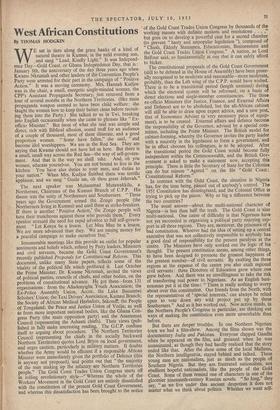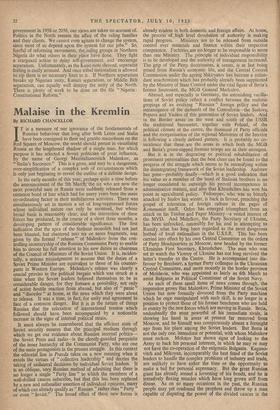West African Constitutions
By THOMAS HODGKIN WE sat in tiers along the grass banks of a kind of natural theatre in Kumasi, in the mild evening sun, and sang " Lead, Kindly Light." It was Independ- ence Day-L-Gold Coast, or Ghana Independence Day, that is : January 8th, the anniversary of the day three years ago when Kwame Nkrumah and other leaders of the Convention People's Party were arrested for their part in the campaign of " Positive Action." It was a moving ceremony. Mrs. Hannah Kudjoe was in the chair, a small, energetic single-minded woman, the CPP's Assistant Propaganda Secretary, just returned from a tour of several months in the Northern Territories. (Her main propaganda weapon seemed to have been child welfare : she taught the women how to keep their babies clean before recruit- ing them into the Party.) She talked to us in Twi, breaking into English occasionally when she came to phrases like " Ex- officio Minister." But most of what she said was simple and direct, rich with Biblical allusion, sound stuff .for an audience of a couple of thousand, most of them illiterate, and a good proportion women. " Some have fallen," she said, " and become idol worshippers. We are in the Red Sea. They are saying that Kwame should not have led us here. But there is a small, small way across the Red Sea—the way of self-govern- ment. And that is the way we shall take. And, oh you women, educate yourselves. You are not bound to live in the kitchen. You have also duties to your men, and duties to your nation." When Mrs. Kudjoe finished there. was terrific applause, and we sang " Guide me, oh thou great Jehovah."
The next speaker was Muhammad Mutawakkilu, a Northerner, Chairman of the Kumasi Branch of C.P.P. His theme was the unity of, Northerners and Southerners. " Three years ago the Government armed the Zongo people (the Northerners living in Kumasi) and used them as strike-breakers. If there is another ' Positive Action,' the Zongo people will turn their truncheons against those who provide them.'. Every speaker stressed the need for rapid advance to full self-govern- ment. " Let Kenya be a lesson. Let Mau Mau be a lesson. We are more advanced 'than they. ' We are raising money for a peaceful campaign to make ourselves free."
Innumerable meetings like this provide an outlet for popular sentiments and beliefs which, refined by Party leaders, Ministers and civil servants, 'became, the Gold Coast Government's recently published Proposals for Constitutional Reform. This document, unlike many State papers, reflects some of the vitality of the political life which produced it. Last October the Prime Minister, Dr. Kwame Nkrumah, invited the views of political parties, councils of chiefs, and other bodies, on the problems of constitutional advance. He got them—from 131 organisations : from the Afiadenyigba Youth Association; the Ex-Police Assembly Union, Accra; the Lake Busumtwi Scholars' Union; the Taxi Drivers' Association, Kumasi Branch; the Society of African Medical Herbalists, Sekondi'; the People of Tonguland; the Peace and Justice Union of Vodja; as well as from more important national bodies, like the Ghana Con- gress Party (the main opposition party) and the Asanteman Council (representing the Ashanti chiefs). Their views (pub- lished in full) make interesting reading. The G.C.P. confines itself to arguing about procedure. The Northern Territories Council (representing the chiefs in the socially backward Northern Territories) quotes Lord Bryce on local government, and urges caution, particularly in military matters. It doubts whether the Army would be efficient if a responsible African Minister were immediately given the portfolio of Defence (this is anyway not proposed), and points out that " the majority of the men making up the infantry are Northern Territories people." The Gold Coast Trades Union Congress starts off in rolling revolutionary style—" Whereas the whole of the Workers' Movement in the Gold Coast are entirely dissatisfied with the constitution of the present Gold Coast Government, and whereas this dissatisfaction has been brought to the notice of the Gold Coast Trades Union Congress by thousands of the working masses with definite motions and resolutions . . . ," but goes on to develop a powerful case for a second chamber (to prevent " hasty and unpopular legislation "), composed of " Chiefs, Elderly Statesmen, Educationists, Businessmen and the Gold Coast Trades Union Congress." A nation, as Lord Balfour said, so fundamentally at one that it can safely afford to bicker.
The constitutional proposals of the Gold Coast Government (still to be debated in the House of Assembly) have been gener- ally recognised to be moderate and reasonable—more moderate, probably, than the Left wing of the C.P.P. would have wished. There is to be a transitional period (length unstated) during which the electoral system will be reformed, on a basis of direct elections and single-member constituencies. The three ex-officio Ministers (for Justice, Finance, and External Affairs and Defence) are to be abolished, but the all-African cabinet will still be able to draw upon expert advice, and a new post, that of Economics Adviser (a very necessary piece of equip- ment), is to be created. External affairs and defence become the responsibility of the Governor, advised by a special com- mittee, including the Prime Minister. The British model for cabinet-forming, whereby the Governor invites the party leader with a majority in the legislature to form a government, and he in effect chooses his colleagues, is to be adopted. After the transitional period the Gold Coast would become fully independent within the Commonwealth, and the British Gov- ernment is asked to make a statement now, accepting this principle. There is little the Secretary of State for the Colonies can do but minute " Agreed " • on the file " Gold Coast:. Constitutional Reform."
In contrast with the Gold Coast, the situation in Nigeria has, for the time being, passed out of anybody's control. The 1951 Constitution has disintegrated, and the Colonial Office is trying to pick up the pieces. Why so big a difference between the two countries?
The usual answer—about the multi-national character of Nigeria—is less than half the truth. The Gold Coast is also multi-national. One cause of difficulty is that Nigerians have not yet succeeded in organising a political party enjoying sup- port in all three regions. They are, moreover, the prisoners of a bad constitution. Whoever had the idea of setting up a central executive that was not collectively responsible to anybody has a good deal of responsibility for the present paralysis at the centre. The Ministers have only worked out the logic of his thought. The present constitution seems, among other things, to have been designed to promote the greatest happiness of the greatest number—of civil servants'. By exalting the three regions at the expense of the. centre you also exalt regional civil servants : three Directors of Education grow where one grew before. And there was an unwillingness to take the risk of transferring real power to Nigerians. As an English busi- nessman put it at the time: " There is really nothing to worry about over this constitution. Our friends from the North, with the representatives of special interests,' can always be relied upon to vote down any wild project put up by these Southerners." And so it has worked out. Now active minds, in the Northern People's Congress in particular, are thinking out ways of making the constitution even more unworkable than before.
But there are deeper troubles. In one Northern Nigerian town we had a film-show. Among the films shown was the documentary India and Pakistan. Everyone clapped Gandhi when he appeared on the film, and groaned when he was assassinated, as though they had hardly realised that the story ended like that. After the show some of the local Mallams, the Northern intelligentsia, stayed behind and talked. These young men are nationalists, just as niuch as the people of Southern Nigeria. But they are frustrated nationalists, not ebullient hopeful nationalists, like the people of the Gold Coast. Some of them remind one of characters in one of the gloomier nineteenth-century Russian novels. " So long," they say, " as we live under this ancient despotism it does not matter what we think about politics. Whether we want self- government in 1956 or 2056, our views are taken no account of. Politics in the North remain the affair of the ruling families and their clients. We cannot even agitate to change the system, since most of us depend upon the system for our jobs." So, fearful of reforming movements, the, ruling groups in Northern Nigeria do what others in their place have done. They fight a rearguard action to delay self-government and encourage separatism. Unfortunately, as the Kano riots showed, separatist feeling is easily aroused. And once tribal nationalism is allowed to rip there is no necessary limit to it. If Northern separatism breaks up Nigerian unity, Kanuri separatism, or Middle Belt separatism, can equally well destroy the unity of the North. There is plenty of work to be done on the file " Nigeria : Constitutional Reform."



































 Previous page
Previous page